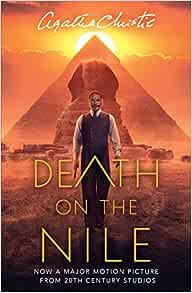My Brainwave for a Great Mystery Novel... or Perhaps Not. By Griselda Heppel
 |
| Murder on the Orient Express by Agatha Christie |
(Ah, turns out they have. See below. Never mind, I'm not stopping now.)
For children’s authors (including, cough, me) the enclosed setting is more likely to be a holiday camp, or a school – boarding, if possible, meaning that your beleaguered hero really is stuck with all the problems you’ve created for him/her, and has to deal with them alone. (See Robin Stevens’s Murder Most Unladylike. Also my The Fall of a Sparrow.)
So, back to my Great Brainwave: why not plot a story in a different kind of closed setting?
The sad fact is that people enter a care home when they are no longer able to look after themselves. When every act, from getting up in the morning to going to bed at night, is so exhausting they can’t do it unaided. When getting from place to place involves a walking frame/wheelchair and someone on hand to help. When chatting and relationship building are made almost impossible by loss of hearing, while the brain, no longer working at its best, tires easily. Creating a group of quick-thinking, agile, problem-solving sleuths under these conditions just isn’t feasible.
So many stories – detective and mystery ones in particular – are set in a closed community that your characters can’t get away from. A train perhaps. Or a boat. (Agatha Christie’s Murder on the Orient Express and Death on the Nile.) An office block (Die Hard, one of my favourite films) or a hotel on fire (The Towering Inferno).
The reasons for this are obvious: throw a bunch of different characters together in a tight cauldron, add some kind of disaster or threat, and BOOM, you have all the ingredients for a gripping, heart-in-mouth tale.
 |
| Death on the Nile by Agatha Christie |
 |
| The Fall of a Sparrow by Griselda Heppel |
One which takes boarders; but not a school or university. Where all kinds of personalities are brought together, learn to get along and are well looked after; but not educated. Because this is a place you go to in the later years of your life, not the early ones.
A care home, in other words.
Your main character could arrive as a new resident – nervous, shy, keen to make friends – and come up against the invisible hierarchy among the seasoned occupants. Toes are trodden on – perhaps literally – people go off in a huff, and your poor hero, now isolated, comes across a dead body… Pretty soon others start to disappear and your hero, along with one stalwart friend in loose cardy and slippers, turns detective. Together they comb the home for clues, lie in wait at dead of night, break open the lock to the strong room and...
No. Not going to work.
 |
| Life is exhausting enough for the elderly without having to solve murders. Photo by Vlad Chețan: https://www.pexels.com/photo/ monochrome-photo-of-an-old-man-2586537/ |
It also feels unfair, not to say patronising, to turn the lives of the elderly into this kind of fiction, when the battles they are fighting against the debilities of old age are very real indeed. Yes, I know, Richard Osman does it, extremely successfully, in his Thursday Murder Club series. I should give his books a try, perhaps.
I just have the nagging suspicion I may not be able to suspend my disbelief enough to enjoy the stories.
OUT NOW
The Fall of a Sparrow by Griselda Heppel
BRONZE WINNER in the Wishing Shelf Awards 2021
By the author of Ante's Inferno
WINNER of the People's Book Prize
Comments
Sometimes relatively young people go into sheltered housing for various reasons. My father-in-law started to nag about wanting to live in a sheltered flat when he was about 60 or so, because he hated having to get anything done around the house or garden!
Re the Richard Osman books - I've listened to a couple of them rather than reading, but I found the second one a bit too long for my taste.
Richard Osman, now his first book kept me going on a recent thirteen hour plane journey, half of it there and half on the way back, and you've just given me a great idea for another closed community - the people closed up together in a Premium Economy Cabin on a long flight!! But, oh no, didn't Agatha Christie get there first with Death in the Clouds? She is the mistress of closed communities as you rightly say, and that's a brilliant tale if you've never read it.
Thanks for the post.
Ah, that would make a difference, Cecilia, if Osman uses a sheltered village rather than a care home. Still, from reading Robert Crampton's analysis of the Thursday Murder Club books' appeal in the Times yesterday, it does all sound rather happy and idealistic. But it's fiction after all (and really I have no right to comment until I've read one!).
Agatha Christie is still the master, I reckon. I've never been able to guess whodunnit in any of her books (while I have in many recent writers' ones). I didn't know about Death in the Clouds, Peter, I'll have to hunt it down. I instantly thought of one of those films celebrated for being hilariously awful, called Snakes on a Plane... enough said!
Thanks for these great comments.